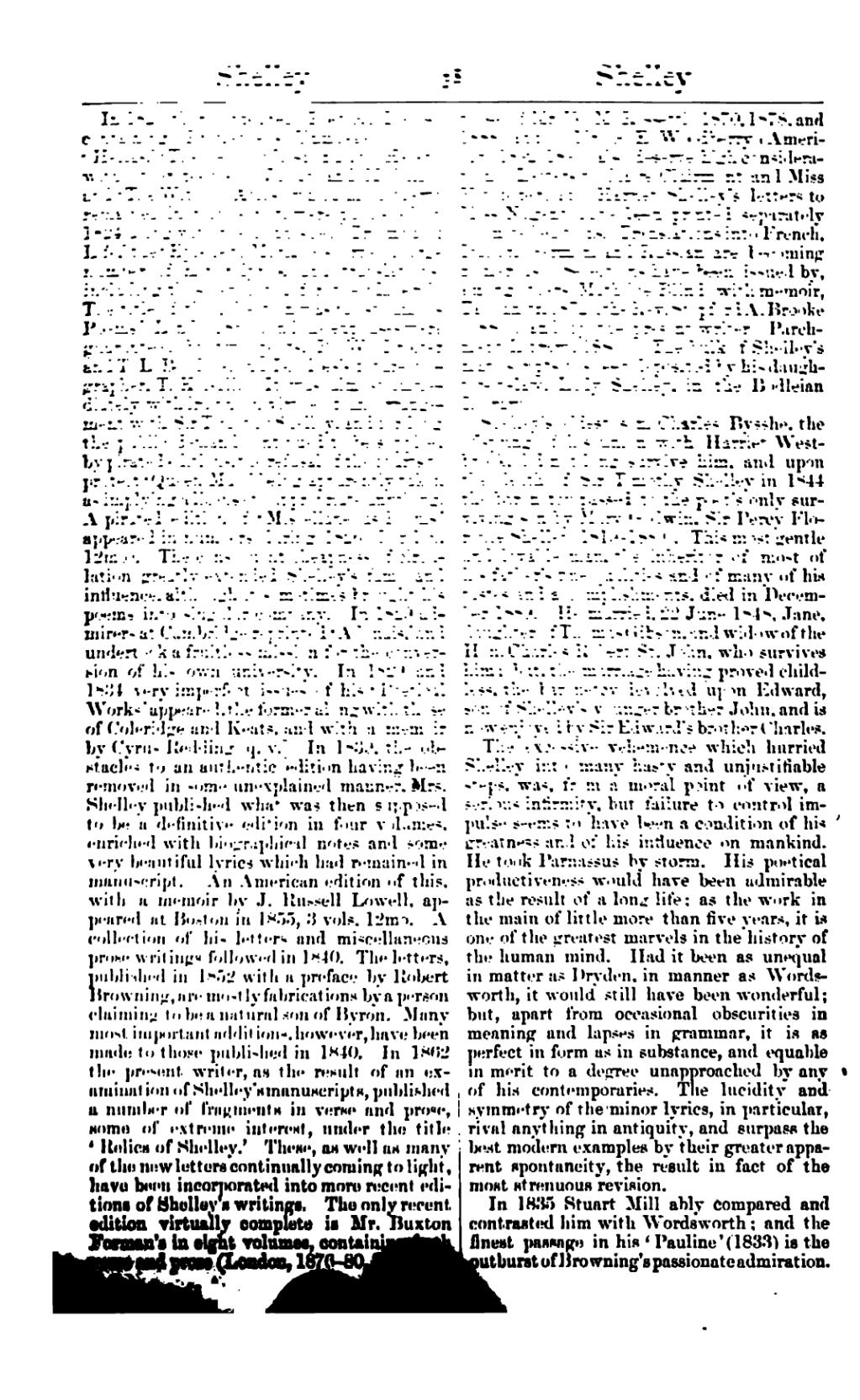In 1823 there appeared ‘Poetical Pieces,’ containing ‘Prometheus Unmasked’ (sic), ‘Hellas,’ ‘The Cenci,’ ‘Rosalind and Helen,’ with other poems. ‘Julian and Maddalo’ and ‘The Witch of Atlas,’ which had hitherto remained in manuscript, were published in 1824 along with the unfinished ‘Triumph of Life,’ the ‘Epistle to Maria Gisborne,’ a large number of minor lyrics, and translations, including those executed for the ‘Liberal.’ The title of the collection was ‘Posthumous Poems’ (London, 8vo), and the expenses were guaranteed by two poets, B. W. Procter and T. L. Beddoes, and Beddoes's future biographer, T. Kelsall. It was almost immediately withdrawn in virtue of an arrangement with Sir Timothy Shelley, and for long the public demand continued to be supplied by pirated editions, the refusal of the courts to protect ‘Queen Mab’ being apparently taken as implying a license to appropriate anything. A pirated edition of ‘Miscellaneous Poems’ appeared in numbers during 1826 (London, 12mo). The consequent cheapness of circulation greatly extended Shelley's fame and influence. In 1829 admirers at Cambridge reprinted ‘Adonais,’ and undertook a fruitless mission for the conversion of his own university. In 1829 and 1834 very imperfect issues of his ‘Poetical Works’ appeared, the former along with those of Coleridge and Keats, and with a memoir by Cyrus Redding [q. v.] Another edition of his ‘Works’ in one small volume was published by Charles Daly in 1836. In 1839, the obstacles to an authentic edition having been removed in some unexplained manner, Mrs. Shelley published what was then supposed to be a definitive edition in four volumes, enriched with biographical notes and some very beautiful lyrics which had remained in manuscript. An American edition of this, with a memoir by J. Russell Lowell, appeared at Boston in 1855, 3 vols. 12mo. A collection of his letters and miscellaneous prose writings followed in 1840. The letters, published in 1852 with a preface by Robert Browning, are mostly fabrications by a person claiming to be a natural son of Byron. Many most important additions, however, have been made to those published in 1840. In 1862 the present writer, as the result of an examination of Shelley's manuscripts, published a number of fragments in verse and prose, some of extreme interest, under the title ‘Relics of Shelley.’ These, as well as many of the new letters continually coming to light, have been incorporated into more recent editions of Shelley's writings. The only recent edition virtually complete is Mr. Buxton Forman's in eight volumes, containing both verse and prose (London, 1876–80, 8vo); but those of Mr. W. M. Rossetti (1870, 1878, and 1888) and of Mr. G. E. Woodberry (American, 1892, 1893) deserve consideration. Letters to Claire Clairmont and Miss Hitchener, and Harriet Shelley's letters to Miss Nugent, have been printed separately. A full collection of the letters to Elizabeth Hitchener was first edited by Bertram Dobell, 1908. Translations into French, Italian, German, and Russian are numerous. Selections have been edited by Stopford A. Brooke (1880) and by the present writer (Parchment Library, 1880). The bulk of Shelley's manuscripts has been deposited by his daughter-in-law, Lady Shelley, in the Bodleian Library.
Shelley's eldest son, Charles Bysshe, the offspring of his union with Harriet Westbrook, did not long survive him, and upon the death of Sir Timothy Shelley in 1844 the baronetcy passed to the poet's only surviving son by Mary Godwin, Sir Percy Florence Shelley (1819–1889). This most gentle and lovable man, the inheritor of most of his father's fine qualities and of many of his tastes and accomplishments, died in December 1889. He married, 22 June 1848, Jane, daughter of Thomas Gibson, and widow of the Hon. Charles Robert St. John, who survives him; but, the marriage having proved childless, the baronetcy devolved upon Edward, son of Shelley's younger brother John, and is now enjoyed by Sir Edward's brother Charles.
The excessive vehemence which hurried Shelley into many hasty and unjustifiable steps, was, from a moral point of view, a serious infirmity, but failure to control impulse seems to have been a condition of his greatness and of his influence on mankind. He took Parnassus by storm. His poetical productiveness would have been admirable as the result of a long life; as the work in the main of little more than five years, it is one of the greatest marvels in the history of the human mind. Had it been as unequal in matter as Dryden, in manner as Wordsworth, it would still have been wonderful; but, apart from occasional obscurities in meaning and lapses in grammar, it is as perfect in form as in substance, and equable in merit to a degree unapproached by any of his contemporaries. The lucidity and symmetry of the minor lyrics, in particular, rival anything in antiquity, and surpass the best modern examples by their greater apparent spontaneity, the result in fact of the most strenuous revision.
In 1835 Stuart Mill ably compared and contrasted him with Wordsworth; and the finest passage in his ‘Pauline’ (1833) is the outburst of Browning's passionate admiration.

